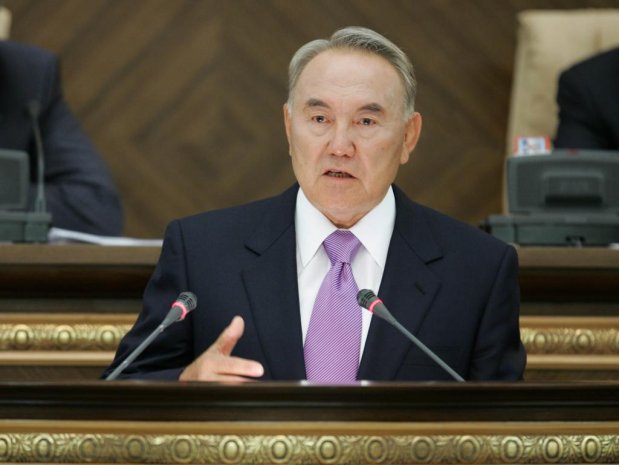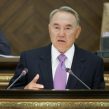
Kazakhstan’s Presidential Referendum Scrapped, Pre-Term Election Initiated After Constitutional Verdict
Publication: Eurasia Daily Monitor Volume: 8 Issue: 22
By:

On January 31, Kazakhstan’s Constitutional Council ruled against holding a national referendum that would have prolonged President Nursultan Nazarbayev’s term of office until 2020. Without objecting to Nazarbayev’s continuing presidential tenure, the council determined that resorting to a referendum in the form proposed, instead of presidential elections, would not correspond with the constitution. The council also found that replacing presidential elections with a referendum could cause an imbalance between the powers of the presidency and those of other state institutions (Kazinform, Khabar news agency, January 31).
Technically, the Constitutional Council’s verdict invalidates the amendments to the constitution, which both chambers of Parliament had recently approved, preparatory to a presidential referendum. Those amendments required Nazarbayev’s signature in order to enter into force. Announcing the negative verdict on the amendments, Constitutional Council’s Chairman, Igor Rogov, noted that they could not be signed and promulgated by the president. The council also cited Nazarbayev’s own doubts on the constitutionality of the amendments, which had prompted the president himself to refer them to the council for vetting (EDM, January 27, 28).
Under the constitution, presidential elections are to be held at five-yearly intervals. While the constitution also provides for the expression of popular will by referendum, the extension of presidential powers to 2020 by referendum would have skipped the presidential elections that are due in 2012 and 2017.
The Constitutional Council is a panel of seven legal experts, three of whom (including the chairman) are appointed by the head of state, and two each by the chairmen of the two houses of parliament. Barring a challenge from the head of state, the Constitutional Council’s verdicts take immediate effect upon their adoption and are not appealable.
Within hours of the council’s ruling, Nazarbayev announced his decision to comply and renounce the proposed referendum. At the same time, he proposed holding a pre-term presidential election during the first half of the current year. Exercising a presidential prerogative, Nazarbayev intends to submit the necessary legislation for parliamentary approval of a pre-term election. This would reduce Nazarbayev’s current presidential term by at least 18 months; but he would continue serving in the next term, he declared, confident of popular support as expressed during the referendum campaign (Kazinform, Khabar news agency, January 31).
The referendum initiative had presented Nazarbayev with legal and political dilemmas. On one hand, the head of state could hardly turn down a petition already endorsed by more than half of the country’s eligible voters through their signatures. On the other hand, Nazarbayev and his team did not want to proceed without clearance from the Constitutional Council. They also concluded that amending the constitution to fit a one-time situation, and one particular president, could be seen as a precedent that politicians might abuse at some future time.
Holding a pre-term presidential election in 2011 is a midway solution between calling a referendum in 2011 and holding the presidential election in 2012. Nazarbayev’s high popularity would practically guarantee his success in either of these formats. His serial re-elections since 1991 have amounted to a periodic referendum on his performance.
In 2007, the parliament had passed a constitutional amendment allowing Nazarbayev to seek re-election for an unlimited number of presidential terms, although shortening each term to five years, instead of seven. The unlimited number of terms in office applies only to Nazarbayev; future presidents are still limited to two terms of five years each under the existing constitution. In May-June 2010, the parliament designated Nazarbayev as honorific “Leader of the Nation” (El-Basy), with authority to participate in national decisions after retiring from the presidency, and legal immunity for himself and his family. The president distanced himself publicly from that law, but stopped short of blocking it. The just-scrapped referendum included a provision to elevate the status of that law by incorporating it into the constitution.
The referendum initiative had originated in mid-December 2010 with members of the Nur Otan governing party and allied civic groups, proposing to extend Nazarbayev’s term of office until 2020. Duly registered by the Central Electoral Commission, the Kazakhstan 2020 campaign collected more than five million signatures, amounting to 55 percent of the country’s eligible voters, in favor of that proposition by early January (the law requires 200,000 signatures for calling a referendum).
Parliament followed due process by adopting the proposed constitutional amendments and requesting Nazarbayev to call a referendum for their approval. Nazarbayev vetoed the amendments; but on January 14, the bicameral parliament overrode the president’s veto. On January 17 the president referred the amendments to the Constitutional Council. On January 21, Nazarbayev chaired a consultative session during which parliamentarians, senior government officials, cultural figures, and pro-government civic organizations’ leaders urged him to endorse the proposal and call the referendum. The president, cautiously weighing the issue in his speech, reserved judgment pending the Constitutional Council’s assessment. The council had 30 days to issue a ruling, but did so faster.
Delivering the annual state-of-the-nation address in parliament on January 28, Nazarbayev made clear his readiness to continue serving beyond 2012 and oversee the implementation of Kazakhstan’s development programs, “as long as [his] health and strength allow” (Nazarbayev will turn 71 this year), and subject to a renewed popular mandate. On foreign policy he unveiled a proposal to the European Union to work out a Kazakhstan-EU Energy Charter, a legal and political framework for ensuring energy supplies to European markets and development of pipeline systems. He also proposed holding a donors’ conference on Afghanistan this year in Almaty (Khabar Television, January 28).
In that address, as in his January 31 statement accepting the Constitutional Council’s verdict, Nazarbayev alluded to a new role for the Kazakhstan 2020 coalition, which has formed around the Nur Otan party to support the referendum. This coalition will campaign during the upcoming presidential election, and seems a likely basis for broadening the parliament’s composition in the next parliamentary elections. These are due in 2012 and are expected to mark a turn from single-party representation to an incipient pluralism.




